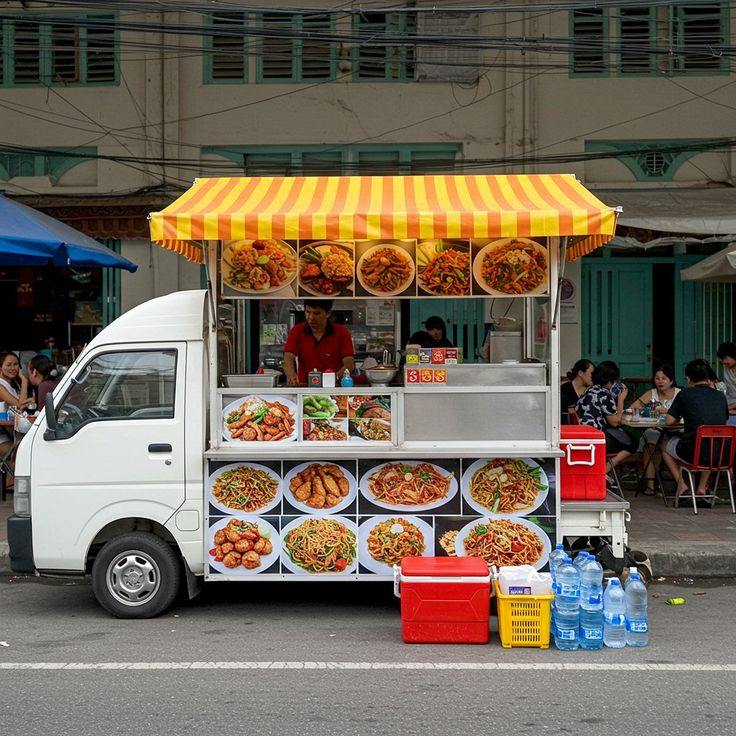Starting a food business in Cambodia is risky, but potentially rewarding endeavor if you want to live in the Kingdom. Cambodia offers a surprisingly easy path to setting up a company and getting a visa, making it a popular choice for entrepreneurs looking to open food ventures.
Whether you want to sell traditional Khmer dishes or launch an international fusion concept, the food business in Cambodia scene is open and vibrant, especially in cities like Phnom Penh.

Image: bt food story
How to Get a Cambodian Visa for Your Food Business
Before you start cooking, you need to sort out your visa. Most foreigners who want to open a food business go for the E-Visa, which is similar to a work visa. This visa not only allows you to legally work in Cambodia but also lets you set up a company or register yourself as a sole trader. The sole trader route is one of the easiest and most common ways people start food businesses because it requires less paperwork and is quite flexible.
If you want the nitty-gritty on visas, there are plenty of guides online, but the takeaway is that Cambodia makes it straightforward for foreigners who want to invest in the food sector.
Click to see my guide to Cambodian Visas.
Choosing the Right Company Type
When setting up your food business in Cambodia, you have three main legal options. You can work informally as self-employed, register as a sole proprietorship or partnership, or form a limited company. Each has pros and cons depending on how big you want your business to be.
Many local entrepreneurs start under the sole proprietorship model because it is simpler. However, if you want to limit your personal liability, a limited company is the safer bet. Things can go wrong in any business, and Cambodia’s business environment can be unpredictable at best!!!
What Types of Food Businesses Can You Open?
The possibilities for food business in Cambodia are nearly endless. The market is very open to different types of eateries and food ventures. While small street stalls or tuk-tuk driving without a proper license might be frowned upon or even illegal, you can legally open almost any other food business you like.
Phnom Penh is a fantastic example of this openness. The city has an eclectic food scene where Ethiopian injera restaurants sit next to French taco spots and traditional Khmer noodle stalls. Chinese fast food cafes are common as well. This diversity means you can tap into a wide range of culinary styles and customer bases.
You are also free to open a franchise. While McDonald’s has not arrived in Cambodia yet, international chains like KFC and Burger King are well established. There are still plenty of franchising opportunities for brands that have not yet entered the Cambodian market.
Click to read my article on franchising in Cambodia.


Running a Food Business in Cambodia: What to Expect
Running a food business here comes with unique challenges and advantages. Taxes are supposed to be paid monthly for both companies and employees, but many small food businesses operate under the radar. Enforcement around licensing for liquor and food varies across the country, but ideally, you should have a business license that clearly states the nature of your establishment.
The informal nature of the market means many locals open restaurants without the heavy red tape seen in other countries. This entrepreneurial spirit allows for rapid opening of new eateries and quick adaptation to trends or customer tastes.
Why Locals Just Open Restaurants and Food Stalls Without Hesitation
One of the most fascinating things about the food business in Cambodia is how easily locals start restaurants or food stalls. In Phnom Penh, the food scene is a vibrant mosaic of cultures and cuisines. Locals don’t wait for mountains of paperwork or government approvals. If they have a stove, a few tables, and a decent spot, they just start serving food.
This low barrier to entry means new restaurants appear all the time, ranging from tiny family-run noodle shops to hip fusion cafes. It creates an ever-changing food landscape where you can experiment, find your niche, and grow your business.


Buying a Food Business Instead of Starting from Scratch
If starting a new food business feels daunting, you can always buy an existing one. Cambodia’s business scene is highly fluid, with many food businesses regularly changing hands. Facebook groups dedicated to business sales are packed with listings for restaurants, cafes, and street food stalls.
Websites like Khmer24 also have classified sections where food businesses occasionally appear for sale. This is a great way to enter the market with an established customer base, but always make sure to do thorough research before buying.

Final Thoughts on Starting a Food Business in Cambodia
Starting a food business in Cambodia can be a rewarding venture with the right approach. Whether you want to focus on Cambodian and Chinese fast food or introduce something more exotic, the key is dedication and understanding the local market. Sourcing authentic ingredients is easier than ever with places like Angkor Supermarket and bustling local markets.
Cambodia’s open and eclectic food scene offers a unique opportunity for anyone willing to jump in. If you are passionate about food and ready to hustle, you can build a thriving business in one of Southeast Asia’s most exciting and rapidly growing markets.
And who knows I might even write about ya!

